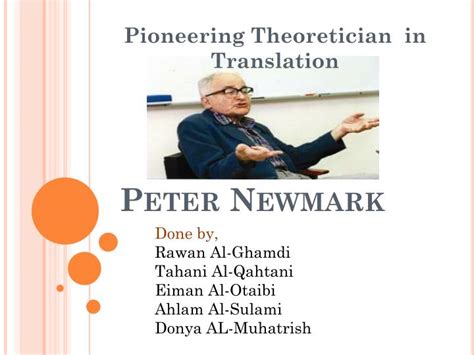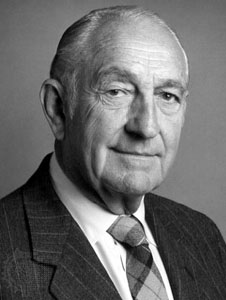A Quote by Peter Newmark
There is no such thing as a perfect, ideal, or 'correct' translation. A translator is always trying to extend his knowledge and improve his means of expression; he is always pursuing facts and words.
Related Quotes
All nonfiction writers, whether they like it or not, are translators. The translator is the perfect journalist. The best journalism endeavors to convey an essential idea or story to an audience that knows very little about it, and that requires translation. To do this successfully, the writer must filter the idea through the prism of his eye, and his mind, and his writing style.
Avoid openly trying to reform people. Every man knows he is imperfect, but he doesn't want someone else trying to correct his faults. If you want to improve a person, help him embrace a higher working goal-a standard, an ideal-and he will do his own 'making over' far more effectively than you can do it for him.
In every art we are always obliged to return to the accepted means of expression, the conventional language of the art. What is a black-and-white drawing but a convention to which the beholder has become so accustomed that with his mind's eye he sees a complete equivalent in the translation from nature?
The great news is that God knows everything about you, both good and bad, and He still loves you and values you unconditionally. God does not always approve of our behavior. He is not pleased when we go against his will, and when we do, we always suffer the consequences and have to work with Him to correct our thoughts, words, actions, or attitudes. And while you should work to improve in the areas where you fall short, nothing you do will ever cause God to love you less…or more. His love is a constant you can depend on.
Paris, as always, is swarming with Americans, and these days, it's also swarming with hamburgers. Oddly, though, it's not typically the Americans who are pursuing the perfect burger on the perfect bun with the obligatory side of perfect coleslaw; the Americans are pursuing the perfect blanquette de veau.
Poets are always making waves. I mean, you know, in an ideal situation, the ideal republic can't tolerate poets because - it isn't that they mutter and criticize; it is that the poet does not accept the situation called the 'perfect' condition of man - in other words, perfect in the materialistic sense.
Some men -- not all men -- see always before them an ideal, a mental picture if you will, of what they ought to be, and are not. Whoso seeks to follow this ideal revealed to the mental vision, whoso seeks to attain to conformity with it, will find it enlarge itself, and remove from him. He that follows it will improve his own moral character, but the ideal will remain always above him and before him, prompting him to new exertions.
[The scientist] believes passionately in facts, in measured facts. He believes there are no bad facts, that all facts are good facts, though they may be facts about bad things, and his intellectual satisfaction can come only from the acquisition of accurately known facts, from their organization into a body of knowledge, in which the inter-relationship of the measured facts is the dominant consideration.
Three explanations dominate speculation about what Obama is up to. The first is that he's trying to lay the groundwork for his successor, presumptive nominee Hillary Clinton. The second is that he's trying to pad his legacy. The third is that he's trying to 'troll' or bait the GOP into debating his agenda rather than pursuing its own. All are plausible, and none necessarily contradicts the others.
































